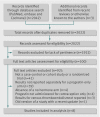Assessing the risk of venous thromboembolic events in women taking progestin-only contraception: a meta-analysis
- PMID: 22872710
- PMCID: PMC3413580
- DOI: 10.1136/bmj.e4944
Assessing the risk of venous thromboembolic events in women taking progestin-only contraception: a meta-analysis
Abstract
Objectives: To evaluate the risk of venous thromboembolic events associated with the use of progestin-only contraception and whether that risk differs with the mode of drug delivery (oral, intrauterine, or depot injection).
Design: Systematic review and meta-analysis of randomised controlled trials and observational studies.
Data sources: Pubmed, Embase, Cochrane Library, and reference lists of relevant reviews.
Study selection: Randomised controlled trials and case-control, cohort, and cross sectional studies with venous thromboembolic outcome for progestin-only contraception reported relative to a non-hormone comparator group.
Data extraction: Data were extracted by two independent investigators, and consensus for inclusion was reached after assessment by additional investigators.
Results: Among the 2022 unique references identified by all searches, eight observational studies fulfilled inclusion criteria. A total of 147 women across all studies were diagnosed with a venous thromboembolic event while taking progestin-only contraception, and the summary measure for the adjusted relative risk of a venous thromboembolic episode for users versus non-users of a progestin-only contraceptive was, based on the random effects model, 1.03 (95% CI 0.76 to 1.39). Subgroup analysis confirmed there was no association between venous thromboembolic risk and progestin-only pills (relative risk 0.90 (0.57 to 1.45)) or a progestin intrauterine device (0.61 (0.24 to 1.53)). The relative risk of a venous thromboembolic event for users of an injectable progestin versus non-users was 2.67 (1.29 to 5.53).
Conclusions: Published data assessing the risk of venous thromboembolism in women prescribed progestin-only contraception are limited. In this meta-analysis of eight observational studies, the use of progestin-only contraception was not associated with an increased risk of venous thromboembolism compared with non-users of hormonal contraception. The potential association between injectable progestins and thrombosis requires further study.
Conflict of interest statement
All authors have completed the ICMJE uniform disclosure form at
Figures




Similar articles
-
Risk of thromboembolism in patients with COVID-19 who are using hormonal contraception.Cochrane Database Syst Rev. 2023 Jan 9;1(1):CD014908. doi: 10.1002/14651858.CD014908.pub2. Cochrane Database Syst Rev. 2023. Update in: Cochrane Database Syst Rev. 2023 May 15;5:CD014908. doi: 10.1002/14651858.CD014908.pub3. PMID: 36622724 Free PMC article. Updated.
-
Progestin-only contraception and thromboembolism: A systematic review.Contraception. 2016 Dec;94(6):678-700. doi: 10.1016/j.contraception.2016.04.014. Epub 2016 May 3. Contraception. 2016. PMID: 27153743 Free PMC article.
-
Steroidal contraceptives and bone fractures in women: evidence from observational studies.Cochrane Database Syst Rev. 2012 Aug 15;(8):CD009849. doi: 10.1002/14651858.CD009849.pub2. Cochrane Database Syst Rev. 2012. Update in: Cochrane Database Syst Rev. 2015 Jul 21;(7):CD009849. doi: 10.1002/14651858.CD009849.pub3. PMID: 22895991 Updated.
-
Combined hormonal contraceptive use among women with known dyslipidemias: a systematic review of critical safety outcomes.Contraception. 2016 Sep;94(3):280-7. doi: 10.1016/j.contraception.2015.08.002. Epub 2015 Aug 10. Contraception. 2016. PMID: 26272309
-
Hormonally impregnated intrauterine systems (IUSs) versus other forms of reversible contraceptives as effective methods of preventing pregnancy.Cochrane Database Syst Rev. 2004;2004(3):CD001776. doi: 10.1002/14651858.CD001776.pub2. Cochrane Database Syst Rev. 2004. PMID: 15266453 Free PMC article.
Cited by
-
Hormonal therapies and venous thrombosis: Considerations for prevention and management.Res Pract Thromb Haemost. 2022 Aug 23;6(6):e12763. doi: 10.1002/rth2.12763. eCollection 2022 Aug. Res Pract Thromb Haemost. 2022. PMID: 36032216 Free PMC article.
-
Current Issues and Options for Hormonal Contraception in Adolescents and Young Adult Women With Sickle Cell Disease: An Update for Health Care Professionals.Mediterr J Hematol Infect Dis. 2020 May 1;12(1):e2020032. doi: 10.4084/MJHID.2020.032. eCollection 2020. Mediterr J Hematol Infect Dis. 2020. PMID: 32395221 Free PMC article. Review.
-
Sex matters: Practice 5P's when treating young women with venous thromboembolism.J Thromb Haemost. 2019 Sep;17(9):1417-1429. doi: 10.1111/jth.14549. Epub 2019 Jul 23. J Thromb Haemost. 2019. PMID: 31220399 Free PMC article. Review.
-
Estrogen, progestin, and beyond: thrombotic risk and contraceptive choices.Hematology Am Soc Hematol Educ Program. 2024 Dec 6;2024(1):644-651. doi: 10.1182/hematology.2024000591. Hematology Am Soc Hematol Educ Program. 2024. PMID: 39644023 Free PMC article. Review.
-
Hormonal contraception in women with migraine: is progestogen-only contraception a better choice?J Headache Pain. 2013 Aug 1;14(1):66. doi: 10.1186/1129-2377-14-66. J Headache Pain. 2013. PMID: 24456509 Free PMC article. Review.
References
-
- Helmerhorst FM, Bloemenkamp KW, Rosendaal FR, Vandenbroucke JP. Oral contraceptives and thrombotic disease: risk of venous thromboembolism. Thromb Haemost 1997;78:327-33. - PubMed
-
- Gerstman BB, Piper JM, Tomita DK, Ferguson WJ, Stadel BV, Lundin FE. Oral contraceptive estrogen dose and the risk of deep venous thromboembolic disease. Am J Epidemiol 1991;133:32-7. - PubMed
Publication types
MeSH terms
Substances
Grants and funding
LinkOut - more resources
Full Text Sources
Other Literature Sources
